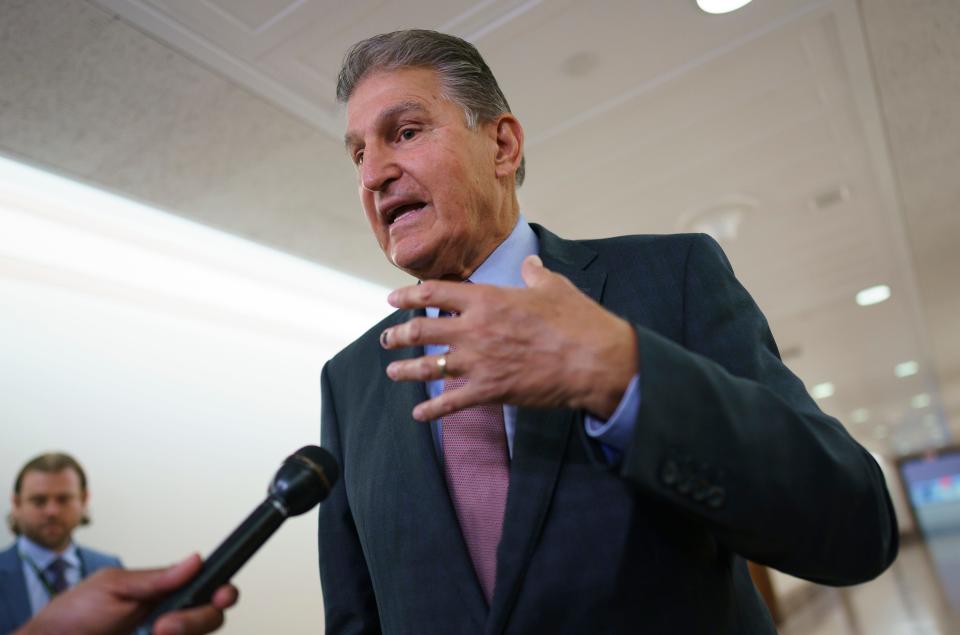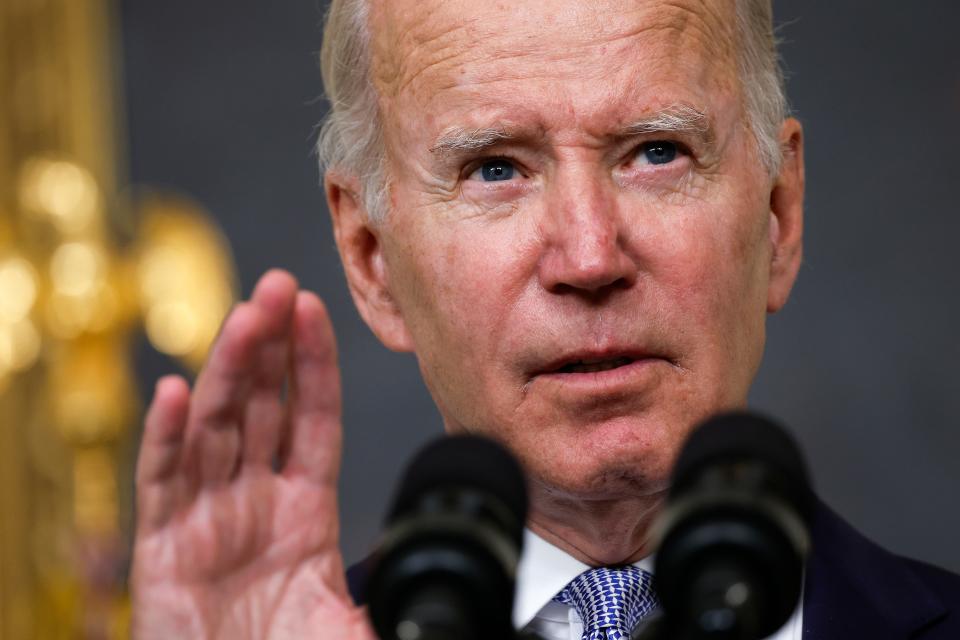Advocates praise Schumer-Manchin climate deal, despite a possible short-term bump in oil, gas leases
- Oops!Something went wrong.Please try again later.
- Oops!Something went wrong.Please try again later.
WASHINGTON – President Joe Biden's initial ambitions to combat climate change called for an aggressive phase-out of fossil fuels.
Sen. Joe Manchin, D-W.Va., the coal country lawmaker whose state economy depends on natural gas production, was never going to let that happen.
Instead, the deal Manchin brokered over the past week with Senate Majority Leader Chuck Schumer, D-N.Y., could actually expand the nation's reliance on fossil fuels – at least in the short run. While it's heavy on tax credits and incentives to help build out the nation's still-maturing clean energy sector, it opens up the potential for more oil and gas exploration during the transition to a greener economy.
"I just could not absolutely in any way - it's aspirational - (support) getting rid of everything," Manchin told reporters Thursday, referring to his fellow Democrats' desire to abandon carbon-emitting fossil fuels. "Eliminate, eliminate, eliminate isn't going to work at all. I was never for that."
"This is a bill that keeps the fossil industry and keeps the country in a very strong position until those new technologies – whenever that may be, 10, 20 years from now – (are) able to kick in," he said. "And that transition will happen when, whatever you have that you're using, you've got something better to replace it with and it can do just as well if not better. Cheaper prices. The market takes over."

Some activists immediately panned the plan, saying the prospect of letting fossil fuels expand was hard to swallow even with billions for clean energy components.
Brett Hartl, government affairs director at the Center for Biological Diversity, warned the measure would push massive oil and gas leasing in the Gulf of Mexico and Alaska and mandate that millions more acres of public lands be offered for leasing before any new solar or wind energy projects could be built on public lands or waters.
Accelerating crisis: Climate change exposes growing gap between weather we've planned for – and what's coming
“This is a climate suicide pact,” he said in a statement. “It’s self-defeating to handcuff renewable energy development to massive new oil and gas extraction."
50-50 Senate means Biden needs Manchin's blessing
Despite an initial push last year from Biden, Democratic lawmakers and environmental activists to limit carbon emissions that are warming the planet, there was also a realization this current deal might be the best on the table.
Manchin wields extraordinary influence in Congress, thanks to a Senate that's split 50-50 (with Vice President Kamala Harris allowed to break ties). That means the scope of Biden's climate policy extends only as far as Manchin allows it.
It was the Manchin, who also chairs the Energy and Natural Resources Committee, who scuttled a key part of Biden's Build Back Better bill last year that would have rewarded utilities that sped up their transition to clean energy – and penalized them if they didn't.
Biden is already on board with the latest plan, even though the $369 billion in climate funding as part of the just-announced deal is less than the $555 billion he initially proposed and is expected to fall far short of the president's pledge to decarbonize the country's electrical grid by 2035 and eliminate emissions altogether by 2050.

Speaking from the White House Thursday, Biden called the bill "the most significant legislation in history to tackle the climate crisis and improve our energy security right away. And it’ll give us a tool to meet the climate goals that are set – that we’ve agreed to – by cutting emissions and accelerating clean energy. A huge step forward."
11th-hour deal provides 'much-needed hope'
But any deal on climate seemed dead until Wednesday's announcement.
So most environmental and clean energy advocates said they are generally supportive of the package of climate incentives Manchin and Schumer announced Wednesday as part of the Inflation Reduction Act of 2022. The broader measure also would allow Medicare to negotiate prescription drug prices and cut the deficit by approximately $300 billion over the next decade, in part, by forcing large corporations to pay a minimum 15% tax rate.
What's in the bill?: 'Inflation Reduction Act': What you need to know about major effort to fight climate change
11th-hour deal: With window closing, Sen. Joe Manchin, Senate Leader Schumer reach deal on energy, drug prices, taxes
Johanna Chao Kreilick, president of the Union of Concerned Scientists, called the deal "incredible news and gives us much-needed hope."
The bill, which could be voted on as early as next week, provides billions in tax credits and other incentives to build out clean energy transmission and storage networks, install solar panels and wind turbines, retrofit manufacturing plants, and develop new technologies. There's money to help consumers through home energy rebates and to help them trade in their gas-powered cars for electric vehicles.
There's also $3 billion in the measure to finance the U.S. Postal Service's purchase of thousands of zero-emission trucks, about half what Biden had initially proposed last year.
And it would target methane leaks from natural gas production. Methane is a key contributor to global warming.
Manchin's might: 'These issues are hard': Coal country's centrist senator may hold up Biden's climate change agenda
Postal push: Biden’s Build Back Better bill would speed up conversion to electric mail trucks at struggling USPS
John Larsen, who heads U.S. energy system and climate policy research at the data firm Rhodium Group, doesn't view the bill's leasing component with the same alarm as some environmental activists. He doesn't expect the proposal would enable a massive expansion of oil and gas development and thinks that any desire by fossil fuel firms to expand production would be mitigated by the higher royalty fees the government would impose on public lands.
The green energy components, he predicted, would be a "much more significant influence on emissions" than any potential increase in fossil fuel production.
Christy Goldfuss, senior vice president of energy and environment policy at the Center for American Progress, said tying the development of fossil fuels to the transition to clean energy "does very much seem counterproductive." She she plans to keep fighting future lease sales.
"This overall package, huge step in the right direction," she said Thursday. "But there's a lot of stuff along the way that we will continue to fight against and make the case that this is not productive when we're moving toward a clean energy future."
This article originally appeared on USA TODAY: Climate deal wins advocates' praise despite fossil fuel caveats

